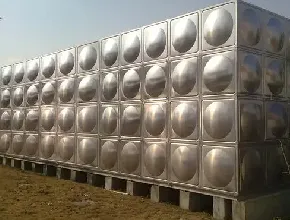loading...
- No. 9, Xingyuan South Street, Dongwaihuan Road, Zaoqiang County, Hengshui, Hebei, China
- admin@zjcomposites.com
- +86 15097380338
- Welcome to visit our website!
Exploring the Advantages of FRP Tanks and Vessels for Industrial Applications
Exploring FRP Tanks and Vessels A Versatile Solution for Modern Industries
In the ever-evolving landscape of industrial applications, the demand for efficient, reliable, and durable storage solutions is paramount. Fiber-Reinforced Plastic (FRP) tanks and vessels have emerged as a popular choice across various sectors, ranging from chemical processing to water treatment and even renewable energy. This article delves into the characteristics, benefits, and applications of FRP tanks and vessels, highlighting their significance in modern industry.
What is FRP?
Fiber-Reinforced Plastic (FRP) is a composite material made of a polymer matrix reinforced with fibers, commonly glass, carbon, or aramid. This combination results in a material that is not only lightweight but also exhibits excellent strength, corrosion resistance, and durability. FRP is increasingly favored over traditional materials like steel or concrete, particularly in environments that challenge the integrity of these conventional materials.
Key Characteristics of FRP Tanks and Vessels
1. Corrosion Resistance One of the standout features of FRP is its remarkable resistance to a wide range of corrosive substances. This characteristic makes FRP tanks an ideal choice for industries dealing with chemicals, oils, and other harsh materials.
2. Lightweight The lightweight nature of FRP facilitates easier installation and transportation. This is particularly beneficial for projects that require large tanks or vessels, as reduced weight minimizes structural support requirements.
3. Customization FRP tanks and vessels can be engineered to meet specific requirements such as size, shape, and coating for insulation or chemical resistance. This customization ensures that they can be tailored to suit various operational needs.
4. Low Maintenance FRP products generally require less maintenance compared to metal alternatives. Their smooth surface prevents buildup, leading to lower cleaning and operational costs over time.
5. Thermal and Electrical Insulation FRP materials provide superior thermal insulation, and being non-conductive, they are safe for use in electrical applications, further broadening their scope of use.
Benefits of Using FRP Tanks and Vessels
The adoption of FRP tanks and vessels presents numerous advantages
frp tank and vessel

- Cost-Effectiveness While the initial investment might be higher compared to traditional materials, the long-term savings in maintenance and replacement costs make FRP a cost-effective option.
- Longevity With resistance to various chemicals and environmental elements, FRP tanks often have a longer lifespan, allowing industries to benefit from extended operational periods without the need for replacements.
- Environmental Impact Many industries today are seeking sustainable solutions. FRP materials can be produced from recycled fibers, and their long life reduces waste compared to more conventional materials.
- Safety The non-corrosive and non-conductive properties of FRP reduce the likelihood of leaks and breaches, protecting both the environment and the workers who handle these materials.
Applications of FRP Tanks and Vessels
1. Chemical Storage Industries handling corrosive chemicals utilize FRP tanks for safe storage and transport, minimizing the risk of leaks and contamination.
2. Wastewater Treatment FRP vessels are widely used in wastewater treatment facilities due to their resistance to harsh chemicals and the ability to handle various pH levels effectively.
3. Oil and Gas In the oil and gas industry, FRP tanks are employed for storing fuels, chemicals, and other hydrocarbons, benefitting from their lightweight and robust nature.
4. Food and Beverage The food industry also makes use of FRP tanks for storage and processing, as they can be manufactured in compliance with food safety standards and regulations.
5. Renewable Energy In solar energy systems, FRP vessels play a crucial role in storing water or other fluids for thermal regulation, showcasing their versatility.
Conclusion
As industries continue to seek innovative and efficient solutions to meet modern challenges, FRP tanks and vessels stand out as a premier choice. Their unique characteristics, coupled with significant benefits, make them suitable for diverse applications across multiple sectors. Investing in FRP technology not only enhances operational efficiency but also contributes to sustainability initiatives, making it a wise choice for forward-thinking businesses. With ongoing advancements in materials and manufacturing processes, the future looks bright for FRP tanks and vessels in industrial applications.
-
The Rise of FRP Profiles: Strong, Lightweight, and Built to LastNewsJul.14,2025
-
SMC Panel Tanks: A Modern Water Storage Solution for All EnvironmentsNewsJul.14,2025
-
GRP Grating: A Modern Solution for Safe and Durable Access SystemsNewsJul.14,2025
-
Galvanized Steel Water Tanks: Durable, Reliable, and Ready for UseNewsJul.14,2025
-
FRP Mini Mesh Grating: The Safer, Smarter Flooring SolutionNewsJul.14,2025
-
Exploring FRP Vessels: Durable Solutions for Modern Fluid HandlingNewsJul.14,2025
-
GRP Structures: The Future of Lightweight, High-Performance EngineeringNewsJun.20,2025
